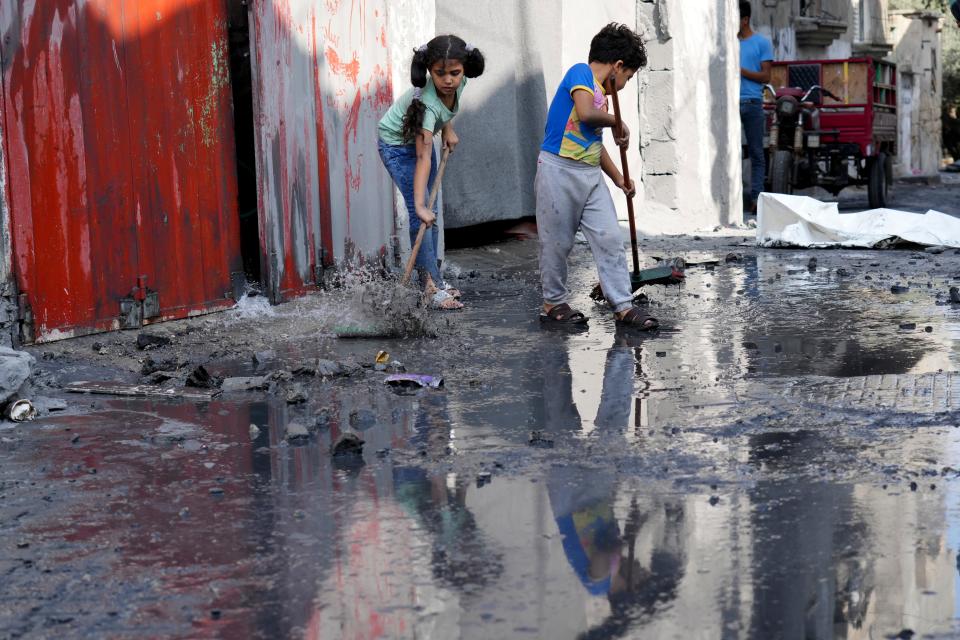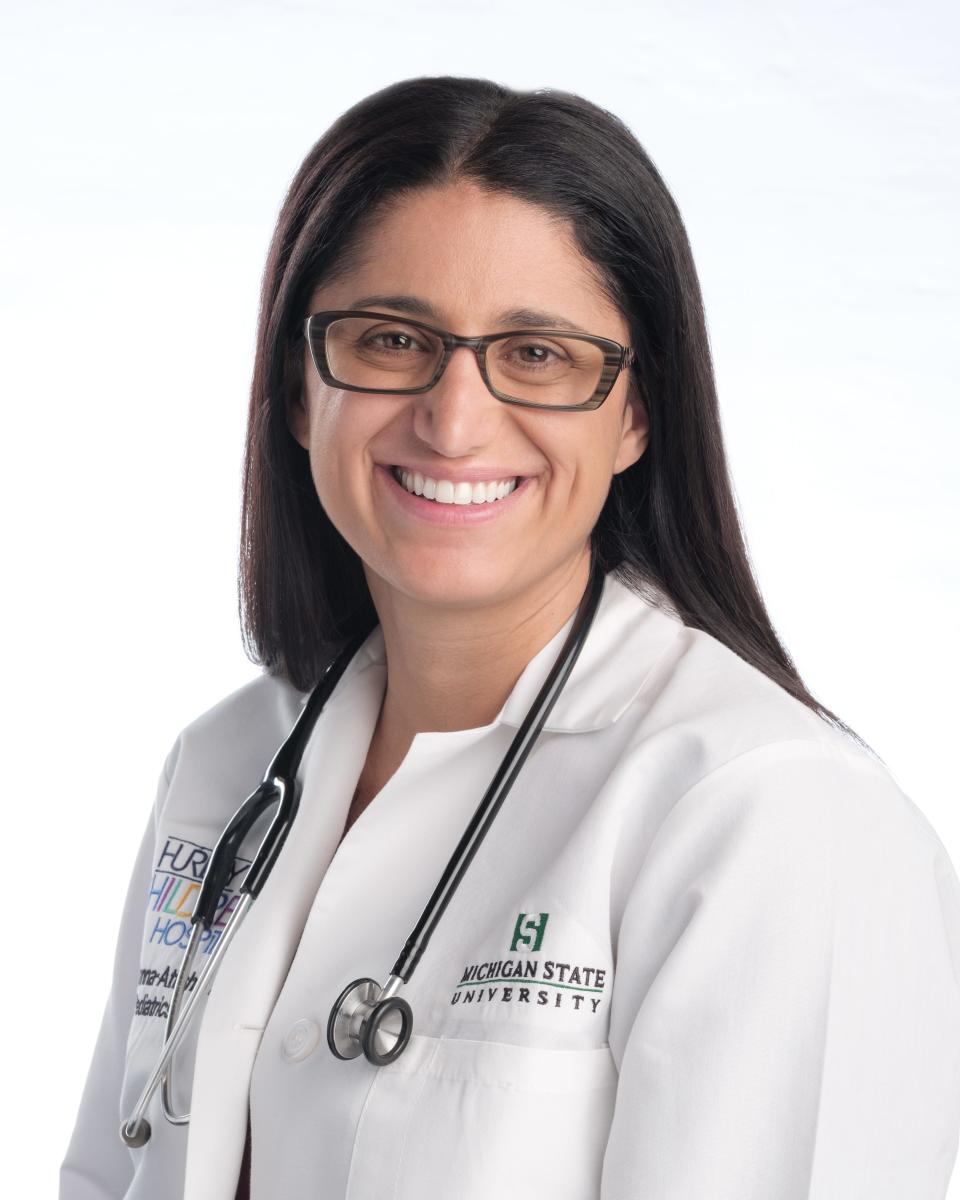Dr. Mona Hanna-Attisha: Let's be the adults the children of Gaza need
Today, World Children’s Day, is hands-down a pediatrician’s favorite holiday (closely followed by National Ice Cream Day, July 21, if you’re wondering). Established in 1954, World Children’s Day embraces and centers the rights and welfare of children. On this day, the United Nations adopted international principles that said all children, no matter where they live, should be treated and given “special protection.” Children have an immutable right “to develop physically, mentally, morally, spiritually and socially in a healthy and normal manner,” according to the UN, “and in conditions of freedom and dignity.”
That’s my everyday privilege as a pediatrician — to protect children and guard their potential. World Children’s Day is a global reminder that it’s really our collective responsibility to guarantee that every child, no matter the color of their skin, zip code, or country of origin, has equality of opportunity.
But some kids are just born in the wrong place, at the wrong time. The wrong side of a wall. And it’s often not an accident of geography or random moments of misfortune that deem some children unworthy of protection.

People tell themselves that unfortunate children must have unfortunate parents — and that whatever happens to them must be their parents’ fault. It is so much easier to believe that their misfortunes and inequities — like poverty and violence — are entirely their own doing. Blaming their parents, or the children themselves, allows us to avoid uncomfortable truths like deeply-rooted racist hierarchies and policies forged in treaty rooms where children were not represented or considered. It allows us to pretend there’s nothing we can do, and somehow we aren’t accountable.
On this World Children’s Day, I’m raising my voice for the children of Gaza who, by no fault of their own, were born on the wrong side of an occupation. Once again, people are looking the other way, blaming parents, dehumanizing children, and, one can’t help but think, telling themselves that it is somehow acceptable to retaliate for the horrendous murder of Israeli children with the many-fold horrendous murder of Palestinian children.
Brutality and savagery are not moral responses to brutality and savagery. Not in our personal lives and not for actors on the global stage. It is not what we teach our own children.
The UN Secretary General said, “Gaza is becoming a graveyard for children.” The number of children who have died in Gaza — estimated at about 5,000 — exceeds the number of dead children in any recent global conflict. In 2022, 477 children were killed in Ukraine. As uncomfortable as I feel about gauging such horror in numerics, by comparison, the scale is catastrophic. According to the World Health Organization, a child is killed in Gaza every 10 minutes.
Among those who have survived, so many children in Gaza are now orphans that Doctors Without Borders has created a new acronym, WCNSF. It stands for Wounded Child No Surviving Family. Safe places like homes, hospitals and schools are under attack; these children are scared, traumatized, hungry, thirsty and poisoned from breathing the powdered remains of their homes.
More from Freep opinion: He believes Trump is president. I thought I could change his mind.
To a pediatrician, the basic ingredients of a healthy childhood are the same for all kids. They need a safe, stable, supportive environment. They need clean air, safe water, healthy food, medical care and shelter. They need hope. And as dictated by the declarations of World Children’s Day, they need special protection.
But the kids of Gaza are receiving far from special protection; they are deprived of even the most basic necessities. We need to ask ourselves a difficult question: Do we value children in Flint and Gaza in the same way that we value children in Grosse Pointe and Tel Aviv?
The ailments of all children are the same, whether they are white or Black or brown. To a mortician, there are no differences either.
For the surviving children of Gaza, the supposedly lucky ones, we know that no matter how strong and resilient they are, adversity early in a child’s life — like exposure to war and violence and deprivation — alters their body and biology, creating a troubling trajectory over their life-time, and even epigenetic or multigenerational scars. Allowing ourselves to look away, we create far more problems for our future and theirs. We nurture more despair, more unresolved wounds, more hate.
As a pediatrician and a mother, I take a stand for all the kids born in the wrong places. The babies of Gaza — the bundled ones who were taken out of their incubators, some of whom have now died without electricity — look just like my own brown-eyed, brown-skinned daughters. But I hope with all my heart this isn’t the reason that I care, or why I grieve so deeply. They are my children, and they are your children.
For all the kids born in the wrong places — which predict how long they will live and even if they will live — it doesn’t have to be this way. I know from experience that when we find the courage to speak up on behalf of dispossessed children, eventually people will listen. A growing chorus of voices will emerge, a resistance to blindness and numbness. Only then, it becomes possible to do the impossible — and transform places that were once toxic to children into places where they can flourish, where all children can be heard and seen.
Together, on this World Children's Day, let’s be the adults that the children of Gaza desperately need. Let’s raise a white flag and absolve them from crimes they didn’t commit, and give them the special protection they require. The international order we live in, and our country, may currently sanction their suffering. But we have a responsibility to our humanity to stop it. They aren’t the children of Gaza. They are just children, and belong to all of us. They carry on our species, our beliefs, our values and culture.
More from Freep opinion: US has an obligation to save lives. We need to de-escalate Israel-Hamas war.
An immediate ceasefire is the first step. A growing list of groups and politicians worldwide are calling for one. Then, we need to lead a community of nations in a meaningful response that ensures the surviving children of Palestine are protected — and have the resources to heal and grow consistent with basic human rights of freedom, dignity, equality, prosperity and stability. We need to be determined to seek lasting peace and a reckoning on all sides. Decades of failures make it clear that resolving this longstanding conflict will not be easy. But what if we started by doing what is best for kids? What if we made hard decisions with their wellbeing as the goal, rather than an afterthought? What if every day was World Children’s Day, not just today?
We can’t ask the WCNSF kids to forgive us. The thousands who have been murdered are gone — and with them, their hopes and dreams. Time is slipping by — we don’t have a moment to waste — for right in front of us is a chance to be on the right side of history for the kids who were born in the wrong place.

Mona Hanna-Attisha (@MonaHannaA) is a pediatrician and associate dean for public health at Michigan State University College of Human Medicine in Flint. A Time 100 Most Influential Person and USA Today Woman of the Century, she is the author of "What the Eyes Don’t See: A Story of Crisis, Resistance, and Hope in an American City. Submit a letter to the editor at freep.com/letters.
This article originally appeared on Detroit Free Press: Dr. Mona Hanna-Attisha: Let's be the adults the children of Gaza need

